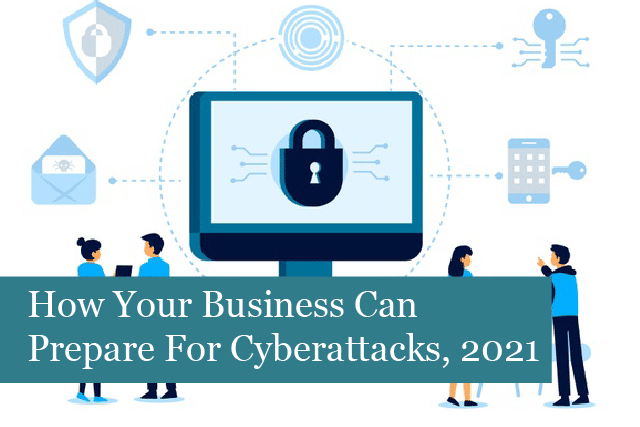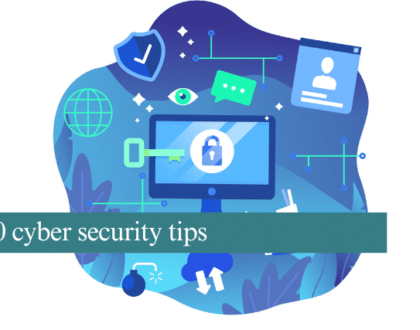
Cybersecurity professionals have predicted an increase in targeted cyberattacks as we go through 2021. These include everything from ransomware to fake software updates and more. Criminals are becoming more creative in the methods they use to attack company networks.
Organisations are falling victim to cyberattacks due to vulnerabilities on their networks. The increase in the number of employees working from home is also creating the perfect situation for cybercriminals.
Another problem is that many companies take a reactive approach to their cybersecurity. In other words, they only take action after an attack has taken place. By that time, it’s too late. The company network has fallen prey to cybercriminals.
We’ve put together a list of specific threats that experts are warning against. You’ll also find actionable steps to help keep your business from becoming another victim of cyberattacks.
1). An Increase in Ransomware
Ransomware is especially insidious when it comes to cyberattacks. In case you’re not familiar with this type of attack, ransomware is malicious software designed to block access to a computer system. The criminals demand a specific amount of money to be paid, which will allow the victim to regain access to their system. Ransomware can be sent through email or other methods.
What’s more, there’s no assurance the criminals will unlock the computer system after receiving the ransom payment. While they’re waiting for payment, some criminals will go ahead and access the system to steal company and personal data.
Ransomware is a horrible and terrifying problem for your company to face. For this reason, it can be helpful to hire an IT support company. They can come in and evaluate any vulnerabilities in your network and improve security to keep you from becoming the next ransomware victim.
2). Working Remotely Has Weakened Company Security
Over the last year, many employees have been required to work from home. Many companies were not prepared for this mass exodus from the workplace. They had no plans or methods in place to increase security for their employees working from home.
At the same time, many businesses were forced to scale down their in-house IT departments. This at a time when IT support was more crucial than ever. With everyone rushing to work from home and a lack of IT staff, security managed to fall between the cracks. Vulnerabilities began to appear in IT networks, making business data less secure.
Hackers have been quick to take advantage of these IT security problems. They’re extremely well-versed in human psychology. Criminals were quick to put this knowledge to work after realising that many employees were not as conscious about security measures when working remotely. Hackers realised that many employees were using their own devices, which were not as secure.
Businesses were slow to realise the problem but have been taking a more proactive stance. Many have turned to IT consultants to increase their security. Companies have seen that the workplace has changed, and more people will continue to work remotely, at least some of the time. This means they require expert guidance on keeping their employees and networks safe in this new era of working from almost anywhere.
3). Phishing Continues to Be a Major Problem
Mass phishing methods have been developed, too. One of the newest methods is called email hijacking. This method creates “phishing lures,” which are culled from stolen email information on infected company systems. These “lures” are then used to respond to conversations. The key here is that these messages contain malware.
The messages may be from the head of the company or another employee. The message may ask that the email recipients purchase gift cards for some purpose. The emails may also use fear, provide invalid information, and more. Here, it’s important to understand the criminals may be able to match a person’s tone, word usage, and more. However, some hackers are not that good and may make mistakes, which tip email recipients off.
In this type of scenario, an IT consultant can help. For instance, a client can report the issue to the consultant, who then provides support to make sure nothing has been shared or accessed. They can work with the company to train everyone on the best practices of cybersecurity. Training can be one of the best defences against cyberattacks.
A Zero Trust Policy is the Best Defence
When working remotely or even in the office, having a zero-trust policy is the best way to keep from falling victim to cybercrime. If your company doesn’t have one in place, now’s the best time to develop and implement a zero-trust policy.
It’s no longer possible to rely on antivirus, applications, and other types of security measures. With more employees working from home, many may hesitate to reach out when a questionable message or another type of cyberattack occurs. With knowledge of a zero-trust policy, these employees will understand exactly what to do in these situations.
If you’re not sure how to develop a zero-trust policy, then this is the best time to call in an IT consultant. They can help you and your employees with ID, authentication methods, and more. These methods may include using biometrics as part of your company’s security. There are more methods that an IT consultant can help you develop and use.
Security Needs a Fresh Approach
Today, company security requires a fresh approach. Gone are the days when you could simply rely on antivirus software to keep your network and data secure. What’s more, taking a proactive stance towards security can make it more challenging for the bad guys.
This is where an IT consultant can help your business. An IT consultant can create an audit of your company’s security and then offer methods to keep your system more secure. The IT consultant can also help with security awareness training while also ensuring your company is compliant with all industry requirements and regulations.
If you’d like more information about our IT consulting services, give us a call today! We can help you ensure your company is protected from cyber threats.
Recommended Posts

IT Simplified: What Is A Firewall?
21st March 2025

10 cyber security tips
14th March 2025

